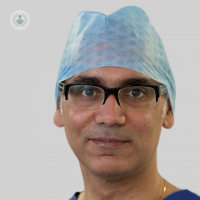TURBT: The gold standard operation for bladder cancer
Written by:Bladder cancer is the most common cancer of the urinary tract and is one of the most expensive cancers to treat. It is also the seventh most common cancer in the UK, with more than 10,000 cases diagnosed yearly. If you have symptoms of bladder cancer, such as blood in your urine, you should see your GP who may refer you to a specialist urologist.

Diagnosis
Your GP may ask for a urine sample and ask about family history and symptoms and carry out a physical examination. If your doctor suspects bladder cancer, you’ll be referred to a specialist for further tests. The first examination is normally a cystoscopy, which allows the inside of your bladder to be inspected using a cystoscope (a camera with a light on the end), which is passed through your urethra. The procedure takes five minutes and is carried out under anaesthetic. A CT scan or an MRI scan may be required if a more detailed picture of your bladder is required. During this procedure, dye is injected into your bloodstream and X-rays are used to study it as it passes through your urinary system.
Transurethral resection of a bladder tumour (TURBT)
If abnormalities are found in your bladder during a cystoscopy, you should be offered an operation known as TURBT, this is the gold standard examination for testing for, and removing, bladder cancer. You are asked not to eat or drink anything for six hours prior to the operation. Abnormal areas of tissue are removed under general anaesthetic and tested for cancer (a biopsy). Sometimes, a sample of the muscle wall of your bladder is also taken (in separate operation within six weeks of the biopsy) to check whether the cancer has spread.
Post-operation
A catheter is used to drain urine into a bag and you are asked to drink lots of fluid to flush out your bladder. This protects you from getting a urine infection. For the first few days you can see blood in the urine but it clears after a few days and at this point the catheter is removed. You should also be offered a round of chemotherapy after the operation. This may help to prevent the bladder cancer returning, if the removed cells are found to be cancerous.


